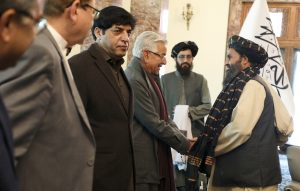On February 22, a high-powered Pakistani delegation, including Pakistan’s Defense Minster Khawaja Muhammad Asif and Director General (DG) of the Inter-Services Intelligence (ISI) Lieutenant General Nadeem Anjum, visited Kabul to discuss prevailing security challenges, particularly the threat of the Tehreek-e-Taliban Pakistan (TTP). The delegation met Afghanistan’s Deputy Prime Minister Mullah Abdul Ghani Baradar, who was accompanied by Interior Minister Sirajuddin Haqqani and Defense Minister Mullah Muhammad Yaqoob. The meeting took place against the backdrop of rising TTP attacks in Pakistan.
Unlike the past, when military-led Pakistani delegations visited Afghanistan, this trip was led by Asif, a civilian. The Pakistani side delivered a stern three-fold message to the Afghan side. First, they asked the Taliban to stop the TTP from launching a spring offensive in Pakistan. It bears mention that the TTP, taking a leaf from the Taliban’s insurgent playbook, launched a spring offensive in Pakistan titled Al-Badar in May 2022. However, after the June ceasefire, the spring offensive lost its momentum.
Pakistani authorities now fear that the TTP might announce another spring offensive, ramping up its militant campaign in Pakistan. In the context of insurgencies and asymmetric conflicts in the Afghanistan-Pakistan region, the spring offensive signifies the traditional fighting season.
Second, the Pakistani side confronted the Afghan authorities with irrefutable evidence of TTP commanders and fighters’ continued presence in Afghanistan and their involvement in the ongoing militant campaign in Pakistan. The Taliban’s interim government officially denies the TTP’s presence on Afghan soil and maintains that the group operates from Pakistan, and that in 2021 and 2022 its leaders traveled from Pakistan to participate in peace talks with the Pakistani government. The Pakistani side impressed upon the Taliban that the TTP was not only using Afghan soil against Pakistan, but it was also recruiting Afghan nationals for terrorist activities in the country. To that end, the Pakistani side also shared data including whereabouts and DNA reports of seven suicide bombers of Afghan origin who carried out attacks in Pakistan.
Finally, the Pakistani team reiterated its demand for disarming and relocating TTP from the Afghan border areas abutting Pakistan. In the past, Pakistan has requested the Afghan authorities to take action against the TTP’s leadership or stop the use of Afghan soil for terrorism as per the Taliban’s obligations under the Doha Agreement reached with the United States in 2020.
Time and again, Pakistan has reminded the Taliban regime that honoring the Doha Agreement will be the test case of its commitments to the international community and would impact its prospects of getting international recognition. Ironically, Pakistan supported the Taliban and facilitated its return to power in the hope of keeping Indian influence in Afghanistan under check and gaining their cooperation against the TTP, notwithstanding the longstanding ethnic, political, ideological, and battlefield affinities between the two groups.
Along with the three aforementioned demands, Pakistani warned the Taliban that it would resort to extreme measures under extraordinary circumstances, including hot pursuit inside Afghanistan against TTP hideouts, if the group was not reined in by the Taliban.
Another striking aspect of the recent visit was that, unlike the past when former DG-ISI Lt. General (retd.) Faiz Hameed used his links with Sirajuddin Haqqani to talk to the TTP, this time Pakistan is engaging with the Taliban in the state-to-state framework. Moreover, now Pakistan is dealing with the Taliban regime to address the issue rather than seeking negotiations with the TTP, which have failed twice in the past.
On their part, the Taliban raised the issue of U.S. drones entering Afghanistan for surveillance and reconnaissance, violating Afghan sovereignty, from Pakistani airspace. The Afghan authorities also raised the issue of frequent border closures and business disruption, underscoring that irrespective of mutual challenges and irritants, the economic activity and cross-border people’s movement should continue. Furthermore, in response to Pakistani demands concerning the TTP, the Taliban have proposed a plan of relocating them from the Afghan border areas abutting Pakistan, provided the latter bears the financial costs.
The proposed Taliban plan is the same template they offered China, under which the Taliban were willing to move Turkestan Islamic Party (TIP) fighters from the northern Badakhshan province near the Chinese border to central parts of Afghanistan. It remains to be seen how Pakistan respond to the Taliban’s offer. It is worth mentioning that Pakistan was not satisfied with the Taliban briefing on its plan to curtail the TTP’s activities in Afghanistan.
According to Asif, a Taliban delegation will visit Pakistan soon to follow up on the February trip.
In the coming days, the TTP’s announcement of a spring offensive, or the lack thereof, will be a key indicator of the success of the Pakistani delegation to Kabul.
The Taliban cannot afford to alienate the TTP. Any Taliban action against the TTP will dent their standing in the jihadist fraternity, giving their ideological arch-foe, the Islamic State of Khorasan Province (ISKP), a great propaganda opening to go on the offensive. Furthermore, if the Taliban dislodge the TTP from its current locations, the pro-TTP factions within the movement might resist such a decision. Likewise, the Taliban know if they push the TTP beyond a certain point, its factions can gravitate toward ISKP, something the Taliban cannot afford.
Hence, while the Taliban will take some nominal steps to address Pakistan’s concerns, nothing substantive is likely to emerge from the Taliban-Pakistan diplomatic parleys.

































